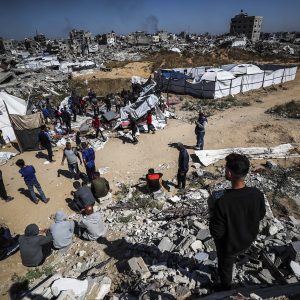EU launches €12 billion partnership with Central Asia at Samarkand summit
TASHKENT, Uzbekistan (MNTV) — The European Union has launched a €12 billion strategic partnership with Central Asia, marking a major new phase of cooperation aimed at boosting infrastructure, energy, digital connectivity, and critical raw materials across the region.
European Commission President Ursula von der Leyen announced the initiative on April 4 at the first EU–Central Asia summit in Samarkand, describing it as the beginning of a “new chapter” in centuries-old ties between the two regions, Gazeta.uz reports.
“Central Asia is a region of proud, sovereign nations with ancient histories and great ambitions,” said von der Leyen. “Your strategic location can open global trade routes and investment flows. These new investments will enhance sovereignty, strengthen economies, and build new friendships.”
The Global Gateway investment package—worth €12 billion—will focus on four key sectors: transport (€3 billion), critical raw materials (€2.5 billion), green energy (€6.4 billion), and satellite internet connectivity (€100 million). The initiative combines funding from the EU and its member states under what Brussels calls the “Team Europe” approach.
Transforming transport corridors
A central pillar of the strategy is the development of the Trans-Caspian Transport Corridor, a route linking Central Asia to Europe via the South Caucasus and the Black Sea. The EU has pledged €10 billion to accelerate the project, which could cut overland transport time between the two regions to just 15 days.
An investment forum focused on the corridor is scheduled for 2025 in Uzbekistan. “This will bring Europe and Central Asia closer together like never before,” von der Leyen said, pointing to potential breakthroughs in regional border openings, including between Armenia, Türkiye, and Azerbaijan.
Investing in critical raw materials
Von der Leyen also underscored the importance of Central Asia’s vast mineral wealth, including 40% of the world’s manganese reserves, as well as lithium and graphite.
“Some global players are only interested in exploiting and extracting,” she warned. “Europe’s offer is different. We want to be your partners in building local industries and adding value on site.”
She cited a €1.6 billion European investment in a copper mine in Almalyk, Uzbekistan, which includes local processing and job creation. Brussels has already signed cooperation agreements with Kazakhstan and Uzbekistan, and a joint declaration was adopted during the summit.
“Your strategic autonomy on raw materials is our strategic interest,” von der Leyen said.
The EU’s third focus is clean energy, with ongoing support for the construction of the Rogun hydroelectric power plant in Tajikistan and the Kambarata plant in Kyrgyzstan. These projects are expected to help transform Central Asia into a hub for sustainable power.
The fourth area of investment targets digital connectivity. A satellite program will connect remote areas across the region, with 2,000 schools and hundreds of villages in Kazakhstan to be linked by the end of this year. A further 1,700 settlements across Central Asia will be connected in the coming years.
“Central Asia may be landlocked, but it is certainly not space-locked,” von der Leyen remarked. “Space can be your gateway to the world.”
Broader financial support
The European Bank for Reconstruction and Development (EBRD) plans to mobilize up to €8 billion in projects across Central Asia by 2027, with a focus on renewable energy and raw materials. Meanwhile, the European Investment Bank (EIB) is set to sign four memorandums of understanding with Uzbekistan, Tajikistan, and Kyrgyzstan, alongside €365 million in funding for transport, water, and climate resilience.
“This is truly the start of a new era in our ancient friendship,” von der Leyen said, framing the partnership as a long-term commitment to shared prosperity and strategic cooperation.









